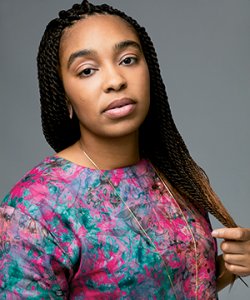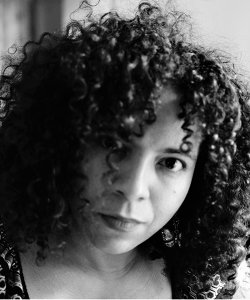Literary MagNet: Hafizah Geter

The poet and essayist on her approach to publishing in literary journals and her path to writing her debut poetry collection, Un-American.
Jump to navigation Skip to content

The poet and essayist on her approach to publishing in literary journals and her path to writing her debut poetry collection, Un-American.
In this Center for Fiction video, Brian Gresko, host of Lit Hub’s Antibody: A Quarantine Reading Series, moderates this all-star fundraiser reading for the Book Industry Charitable Foundation (Binc) featuring Jericho Brown, Carmen Maria Machado, Celese Ng, and Karen Russell.
Alt-rock, barista, codependent, designated driver, e-mail, frisée, G-spot, home theater, multitasker, spoiler alert, wordie. What do all these words have in common? They are all listed with a “first known use” year of 1982 according to Merriam-Webster’s online Time Traveler tool, which allows users to see what words first appeared in written or printed use in each year from the Old English to 2020. Choose a year that has particular resonance to you, perhaps one that marks a turning point or significant event in your life, and browse through the words that are listed as first recorded that year. Write a poem about a memorable event and incorporate some of these words. How does this language transform the tone or thematic direction of your poem?
“A blue against the easy clarities of sky, / a blue that eats the light, a bruise // ascended from forgetfulness.” In this Ours Poetica video, Eduardo C. Corral reads “Kinds of Blue #76 (Evening Snow)” by Don McKay from his collection Camber (McClelland and Stewart, 2004).
Bring in mid-August by submitting to contests with deadlines of August 15 or August 20. These poetry and fiction awards all offer cash prizes of $1,000—or $500 with the opportunity to receive two cases of craft beer!
Dogfish Head Craft Brewed Ales Poetry Prize: A prize of $500, publication by Broadkill River Press, 10 author copies, and two cases of Dogfish Head craft beer are given annually for a poetry collection written by a poet living in Delaware, Maryland, New Jersey, New York, North Carolina, Pennsylvania, Virginia, Washington, D.C., or West Virginia. The winner is expected to attend a reading and award ceremony at the Dogfish Inn in Lewes, Delaware, on December 12. Lodging is provided, but travel expenses are not included. Edgar Kunz will judge. Deadline: August 15. Entry fee: none.
Grayson Books Poetry Prize: A prize of $1,000 and publication by Grayson Books is given annually for a poetry collection. Brian Clements will judge. Deadline: August 15. Entry fee: $25.
Kallisto Gaia Press Poetry and Short Fiction Prizes: Two prizes of $1,000 each and publication in the Ocotillo Review are given annually for a poem and a short story. Chip Dameron will judge the Julia Darling Memorial Poetry Prize; Charlotte Gullick will judge the Chester B. Himes Memorial Short Fiction Prize. Deadline: August 20. Entry fee: $20 (includes a copy of Ocotillo Review).
Red Wheelbarrow Poetry Prize: A prize of $1,000 and publication in Red Wheelbarrow is given annually for a single poem. The winner will also receive 20 copies of a letterpress broadside of the winning poem. Dorianne Laux and Joseph Millar will judge. Deadline: August 15. Entry fee: $15.
The Word Works Tenth Gate Prize: A prize of $1,000, publication by the Word Works, and 50 author copies is given annually for a poetry collection by a poet who has published at least two full-length books of poetry. Lee Ann Roripaugh will judge. Deadline: August 15. Entry fee: $25.
Visit the contest websites for complete guidelines, and check out the Grants & Awards database and Submission Calendar for more contests in poetry, fiction, and creative nonfiction.
“Sometimes I too want to be a poem. / I don’t want to be this pain, / but the language used / to unearth it.” In this Button Poetry video, Michael Lee reads “Just Yesterday” from his debut poetry collection, The Only Worlds We Know (Button Poetry, 2019).
Are trees immortal? Earlier this year, research published in the journal Proceedings of the National Academy of Sciences reported on findings that the biological behavior of gingko trees over six hundred years old was similar to those that were only around twenty years old, prompting the idea that perhaps these trees were immortal. Last month, a new paper published in response in Trends in Plant Science argues that while some trees may indeed live for hundreds or even thousands of years, eventually they are likely to die, and our studies are simply limited by the (relatively) short lifespans of the human beings conducting the studies. Write a pair of poems, one exploring immortality and one exploring mortality. Where do you find yourself turning for allusions or references—nature, civilization, interpersonal relationships?

“I write sporadically and edit often.” —francine j. harris, author of Here Is the Sweet Hand
“We’d cut school like knives through butter, the three / Of us — Peter, Stephen and I — to play / Just about all the music we knew…” In this video, award–winning poet Rowan Ricardo Phillips reads “Boys” from his second collection of poems, Heaven (Farrar, Straus and Giroux, 2015), which was shortlisted for the Griffin Poetry Prize in 2016.

The author of Horsepower recalls the tricks that helped her revise and assemble her collection.